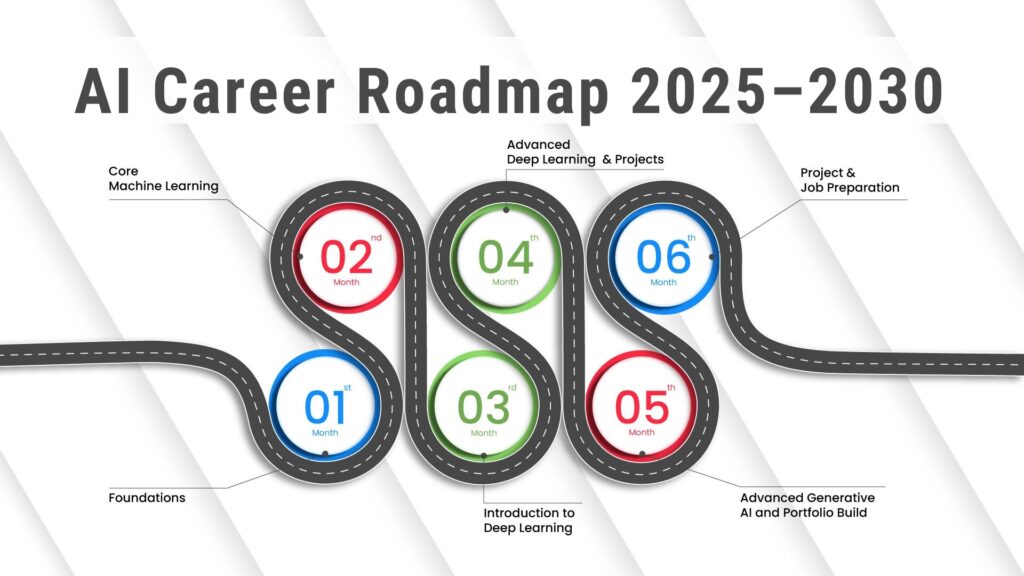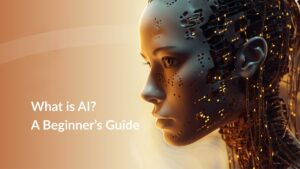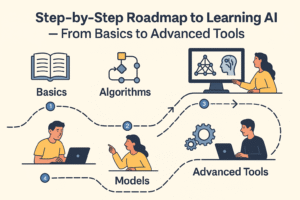
If you think an AI career is only for hoodie-wearing coders at Silicon Valley startups, you’re in for a surprise. The truth? The AI boom is for everyone who’s willing to learn — whether you’re a college student, a mid-career IT professional, or someone whose only coding experience is Ctrl+C and Ctrl+V.
AI is no longer “coming soon” — it’s already here, hiring faster than you can say machine learning. But the next five years? That’s when things get wild. This roadmap will show you exactly which skills to build from 2025 to 2030 so you can ride the AI wave instead of getting wiped out by it.
Why AI Careers Are About to Take Off
By 2030, AI will be woven into everything from finance to farming. In India alone:
- 20,000+ new AI and tech jobs are projected over the next five years (PwC India).
- 10 million+ jobs will be reshaped by Agentic AI — AI that acts with autonomy in complex tasks.
- Startups, corporates, and even government sectors are racing to hire AI-literate professionals.
Globally, AI is moving out of research labs and into boardrooms, marketing teams, factories, and classrooms. And here’s the kicker — there aren’t enough skilled professionals to fill these roles.
Your Five-Year AI Career Roadmap
Years 1–2: Build the Bedrock
This is your foundation phase. Focus on:
- Python & R – Core programming languages for AI projects.
- Machine Learning Basics – Understand algorithms, data structures, and supervised vs unsupervised learning.
- Data Handling Skills – SQL, Pandas, NumPy — your data toolkit.
- Cloud Computing – AWS, Azure, or GCP fundamentals.
Soft skills:
- Analytical Thinking – Seeing patterns and connections others miss.
- Adaptability – AI evolves faster than phone updates; you’ll need to keep up.
- AI Ethics & Literacy – Understanding bias, fairness, and transparency.
💡 Pro Tip: Non-coders can start with prompt engineering or AI project management — high-demand, low-barrier entry points.
Years 3–4: Specialize & Build a Portfolio
Here’s where you level up:
- Deep Learning – Neural networks, CNNs, RNNs.
- Natural Language Processing (NLP) – Chatbots, text classification, language models.
- Computer Vision – Object detection, facial recognition, image segmentation.
- MLOps – Deploying AI models into real-world apps.
Soft skills:
- Collaboration – Bridging the gap between AI engineers and business teams.
- Bias Mitigation – Ensuring AI decisions are fair and ethical.
💡 Pro Tip: By now, you should have at least 3 portfolio projects (Kaggle, GitHub, or real client work).
Years 5–6: Lead & Innovate
You’re now ready for senior and leadership roles:
- AI Architecture – Designing scalable AI systems.
- AI Product Strategy – Turning AI concepts into profitable solutions.
- Research & Innovation – Staying ahead of AI trends like multimodal models and agentic AI.
Soft skills:
- Creativity – Solving problems in ways AI can’t.
- Emotional Intelligence – Leading hybrid human-AI teams.
- Ethics at Scale – Designing AI systems that respect human values.
Target roles:
- AI Architect
- AI Product Manager
- AI Research Lead
- AI Ethicist
Emerging AI Roles to Watch
- Prompt Engineer – The AI whisperer who crafts high-impact prompts.
- AI Ethicist – The conscience of AI teams.
- Data Storyteller – Translating complex data into business insights.
- AI Literacy Trainer – Teaching organizations how to integrate AI.
Learning AI in India
Free Resources:
- IBM SkillsBuild – Government-supported AI learning hub.
- Google AI, Kaggle – Hands-on practice and competitions.
Paid Options:
- upGrad, Great Learning, Coursera – Employer-recognized certifications.
University Pathways:
- IITs, IIITs, and private universities now offer AI-focused degrees.
Quick Snapshot: AI Skills Timeline
| Years | Technical Skills | Soft Skills | Example Roles |
|---|---|---|---|
| 1–2 | Python, ML basics, Data Handling, Cloud | Ethics, Adaptability | Data Analyst, Prompt Engineer |
| 3–4 | Deep Learning, NLP, MLOps, Computer Vision | Bias Mitigation, Teamwork | ML Engineer, AI Ethics Officer |
| 5–6 | AI Architecture, Strategy, Research | Creativity, Leadership | AI Architect, Product Lead |
FAQs
Q1. What’s the fastest way to start an AI career?
Learn Python, ML basics, and start with small projects.
Q2. Can I get into AI without coding?
Yes — focus on prompt engineering, AI ethics, or project management.
Q3. Which AI roles will dominate by 2030?
AI Architect, Prompt Engineer, AI Ethicist, AI Literacy Trainer.
Also Read: Content Creation with AI: Tips for Faster, Better, and SEO-Friendly Results


